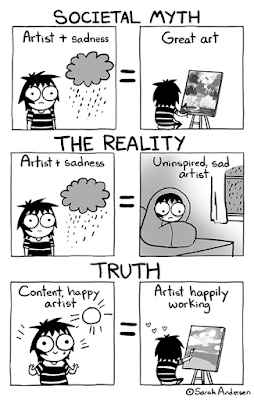During the grieving process, you may go through phases of feeling unmotivated, frustrated, or other such emotions and feelings. Because the whole grief-comes-in-waves thing wasn't enough. This list doesn't exactly follow the five stages of grief, or even the seven stages; it's somewhat of a modified version.
Now, everyone grieves differently, so the process will vary. A person won't necessarily go through these in the order I've written them, or do them one at a time. They can hit multiple things at once, and wield the negativity with great... uh, disaster.
Shock and Denial
When something traumatic happens, you have the feeling of 'I can barely comprehend this actually happened, how are they suddenly just... gone?' The gravity and reality of the situation hasn't sunk in just yet. This tends to occur right after the passing of said person, and is a rather weird mind frame.
Really, you don't want to believe they're gone. You want to think the news you just heard is false, or that it's all a bad dream you'll wake from soon. Or maybe your denial starts earlier than that. They're in the hospital, in bad shape, but you don't want to accept that they're dying.
 |
| Basically this face here, except about something more serious than a broken bottle. |
You might feel like you could cry at any given moment, or you feel like you ought to be crying but aren't, like you've become emotionally numb. Maybe you're watching a movie with a scene you know is sad. You'd probably be crying any other time, but you're just... devoid of that feeling, that ability. It's as though your brain can only process so much, can only hurt so much at a time without falling like a house of cards, so it injects Novocaine into the part that controls emotions. It'll deal with the bad stuff later; technically it has to, because it'll explode if the pent-up feelings are left contained too long. It's a bizarre roller coaster of conflicting emotional states, and it just gets crazier from here.
Bargaining and 'What-if's
This one's all about how things might have been different. In some cases, this goes hand-in-hand with denial. You don't want to admit that they're dying, don't want to admit to yourself that things aren't going to improve, so you plead and bargain and fight every step of the way. You plead with God to heal them, perhaps ask for a miracle. You plead with the doctors to do everything they can.
Whether before or after the death, you find yourself thinking, 'what if?' What if you did this instead, what if they had different doctors or you handled this differently? Or you think about how you wished you let them do this or that. Maybe they were sick for a while prior to their death, and had to go on a special diet which took away many of the foods they loved. Looking back, you find yourself wishing you had let them eat those things. Or maybe you had a surprise to give them when they left the hospital... except they never got out of the hospital. This can lead to guilt and blame, whether towards yourself or others.
Perhaps you even contemplate what life would have been like if they hadn't died. A huge gap is left in their absence, and your entire life has radically changed in many ways. You had plans to do things, see places, do all these things together. You find yourself longing for things that can't be changed or returned to you.
Depression
Because emotional paralysis wasn't enough, let's have depression and apathy now! You ought to clean the floors today. But you're not in the mood. You should be unpacking more of your stuff. But maybe another day. And you can always clean the bathroom tomorrow, or the day after, or the day after that, or maybe next year.
But seriously, that's how it is. You feel you've really been putting off the stuff you ought to do, and you're just so lazy for never doing it. But the honest truth is: you don't want to do anything. It's easier to play Minesweeper and stare mindlessly at television than to do the dishes or write a chapter in your poor lonely manuscript.
What I really enjoy is how some say, "And the artist used their depression and sadness as inspiration for a very moving piece." While sometimes you can find therapy in expressing your emotion in writing, poetry, song, painting, etc., other times you just don't have the motivation or will to do a thing. (motions towards long writing-related to-do list I haven't accomplished)
Loneliness
Because you feel totally alone, even when you have people around you. If you have other problems on top of that, such as a recent move or losing touch with friends, this is further compounded. You may find yourself craving attention and socialization that you're just not getting, feel like you don't have many people to talk to, and at times it seems like you're just an island off on your own, alone and forgotten.
This feeling sometimes expands into things like anger and depression. Irrational feelings of being unnoticed, forgotten, unimportant to a lot of people, begin to infect your mind. You start to take things personally when people don't call you, or when you leave a voicemail or text message that goes unanswered.
Ultimately, you have a gap in your life where something used to be. You have the person who died, the things you used to do with them. And if you've moved or another similar event, you're also away from some of the people you know well. Either way, you have a gaping hole within your heart. And when we can't find what we desire, that hole aches, because the thing that's supposed to fill it is utterly, painfully absent.
Anger
Welcome to being angry much of the time, for no particular reason. It doesn't take much to set off said individual. Honestly, sometimes a part of you just wants an excuse to yell and scream and rage. Little things can make you lose your temper, and other times, there's not much of a trigger. Sometimes, all you have to do is think of things that frustrate you, and you're off.
And of course, there's the possible reasons for your frustration. Sometimes you might be upset with doctors, or with yourself, or any number of other things that you blame for the tragedy. A person might be safer not mentioning the object of your irritation, or staying far away if they're the one you're angry with. Like, maybe in a different galaxy.
But no matter what you're frustrated about, ultimately this mood carries over to things in general. You may become prone to negativity and pessimism, and get worked up over things that might happen rather than what's actually happening.
Acceptance
Honestly, I hate this choice of wording. It makes it sound like...
 |
| Everything is fine. I'm totally okay with this horrible, heart-rending thing that has occurred in my life. |
Then again, perhaps the problem is that 'acceptance' is a word many people absolutely hate to hear when still deep in the grieving process. See 'anger' above for more information about why this word is annoying, and you just can't stand it...
Ultimately, the definition of this is that you come to terms with the fact that this is your new reality. You don't like it, aren't happy with it, but you start to adjust, and your emotions stabilize. You adapt to the new way of life, rather than clinging to what it was before the death of your loved one. The giant wound has closed, the skin has knit together, and the scab comes off.
Of course, the affected area won't be as it was before; you'll always have that scar. And there'll occasionally be bad times, but the good days come to outnumber the bad ones. You begin to emerge from the gray cloud of depression and fully engage with the world again.



Great post! Didn't know much on the stages of grief, but this will come in handy now! Speaking of which, I recommend checking out the game Rime, which I hear also symbolizes the stages through its story game-play.
ReplyDeleteMight be worth trying....